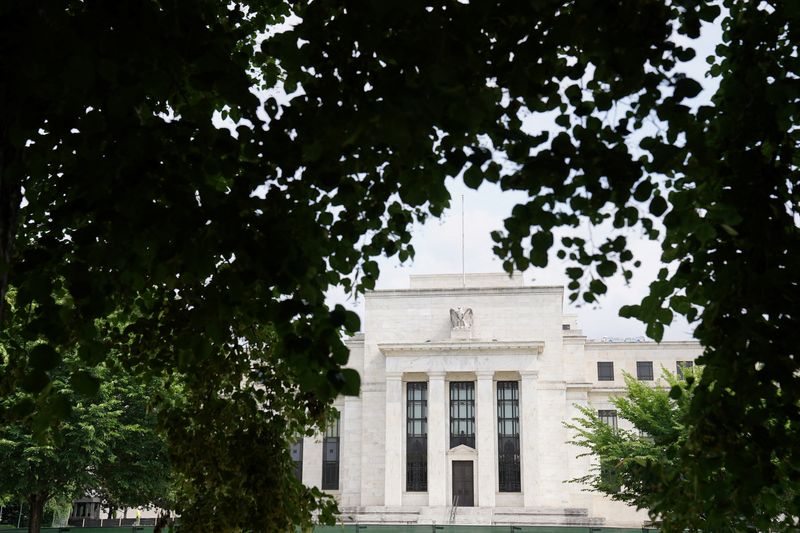By Geoffrey Smith
Investing.com -- Banks rush for the safety of the Fed's liquidity as worries about the banking sector in the U.S. and Europe continue to bubble. China eases monetary policy to juice an underwhelming post-COVID recovery. Stocks are holding on to Thursday's gains, but First Republic falls again in premarket. The Michigan consumer sentiment index rounds off a big week for economic data, and oil prices struggle to make headway. Here's what you need to know in financial markets on Friday, 17th March.
1. Banks run to the Fed
U.S. banks flocked to the Federal Reserve's liquidity facility last week as never before. The central bank's weekly balance sheet showed $153 billion in lending through the discount window - more than at any time during the 2008 crisis - while the Fed's new backstop facility, the Bank Term Funding Program, lent another $12B. Analysts expect the BTFP to account for a greater share of borrowings in the coming weeks due to its more favorable terms.
The news was a reality check to those thinking that the coordinated action to prop up First Republic on Thursday would banish lingering concerns about the stability of the U.S.'s mid-sized banks. First Republic (NYSE:FRC) stock fell 5.6% in premarket trading, unwinding much of Thursday's rally, while PacWest (NASDAQ:PACW) stock fell 2.6%. Other mid-sized banks fared slightly better, while tier-1 bank stocks such as JPMorgan (NYSE:JPM) edged down slightly.
2. China eases monetary policy
At a time when the big western central banks are still in tightening mode, the People's Bank of China relaxed a key instrument of its monetary policy, cutting the reserve requirement ratio for large banks by 25 basis points. It's now at a volume-weighted 7.6%, the lowest since 2007.
The move is aimed at ensuring that the country meets its 5% growth target this year and at supporting "weak links" in the economy (although it didn't specify the real estate sector by name). It comes at the end of a week in which industrial production and trade data disappointed.
Elsewhere, the Kremlin confirmed that President Xi Jinping will visit Moscow next week, in a move that will shed fresh light on China's willingness to support a Russian war in Ukraine that has been a big factor in the weakening of western demand for Chinese factory goods.
3. Stocks set to open mixed
U.S. stock markets are set to open mixed, as Thursday's relief at the rescue act for First Republic gives way to doubts about whether it really addresses the underlying issues that have caused the bank volatility of the last two weeks. Sentiment toward First Republic may not have been helped by news that bank executives were active sellers of their stock in the weeks before deposit flight really started to accelerate.
By 06:45 ET (10:45 GMT), Dow Jones futures were down 91 points or 0.3%, while S&P 500 futures were down 0.1%, and Nasdaq 100 futures were essentially flat. All three of the major cash indices are on course to end the week in the green.
Stocks likely to be in focus later include FedEx (NYSE:FDX), which is up over 11% in premarket after a strong earnings beat and a big rise in its profit outlook for the year despite an expected slowdown in the logistics business.
The Michigan consumer sentiment index at 10:00 ET (14:00 GMT) rounds off a big week for economic data, in which stronger-than-expected numbers from the housing and labor markets helped to cushion the impact of weak retail sales and PPI data earlier in the week.
4. Credit Suisse falls after reported merger rebuff
The sick man of the European banking sector remains firmly in bed. Credit Suisse (SIX:CSGN) stock fell over 8.5% in Zurich after Bloomberg reported that the bank had rebuffed a suggestion from Swiss regulators that its much larger rival UBS take it over. UBS was also reportedly against the deal, according to the newswire.
Switzerland is under pressure to find a solution to a crisis that is hurting its reputation as a financial center, having staked much on imposing the tightest capital and liquidity requirements of all major jurisdictions in the wake of the previous financial crisis. A merger with UBS would violate one long-hold tenet that a merger of those two banks would create unacceptable concentration risks in the Swiss banking sector.
UBS (NYSE:UBS) stock, meanwhile, was also hurt by the news, falling over 3.0% in premarket in New York.
5. Oil struggles amid economic fears
Crude oil prices struggled to make any headway at the end of a week in which concerns over financial stability have forced market participants to take a more conservative view of likely demand growth this year. That's despite official agency forecasts which largely predated the recent banking volatility.
By 06:55 ET, U.S. crude futures were up 0.8% at $68.92 a barrel, while Brent crude was up 0.6% at $75.11 a barrel. Baker Hughes rig count may draw more attention than usual later after the U.S. government predicted that shale oil output is likely to top out in the spring. The CFTC's positioning data, meanwhile, are likely to reflect the liquidation of speculative long positions over the last week.
